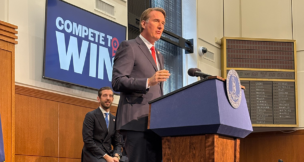
OpenAI CEO Sam Altman speaks during a discussion at the Federal Reserve Integrated Review of the Capital Framework for Large Banks Conference at the Federal Reserve in Washington, Tuesday, July 22, 2025. (AP Photo/Mark Schiefelbein)

OpenAI CEO Sam Altman speaks during a discussion at the Federal Reserve Integrated Review of the Capital Framework for Large Banks Conference at the Federal Reserve in Washington, Tuesday, July 22, 2025. (AP Photo/Mark Schiefelbein)
OurView: Will AI spell lights out for white-collar workers?
Richard Foster //September 1, 2025//
Perhaps the greatest symbol of tech companies’ uncanny valley visions for the AI-powered future are dark factories — also called lights-out factories, these AI-managed manufacturing plants are so fully automated that machines perform their work in full or near darkness 24 hours a day, seven days a week, without breaks — and largely without humans.
So far, there are less than a handful of such plants, all operating outside the United States. Give it time, though, and they’ll likely appear here in the form of lights-out fulfillment warehouses and vehicle assembly lines. Blue-collar workers are hardly the people most in danger of being supplanted by AI, though.
As you’ll read in this month’s issue of Virginia Business, artificial intelligence remains a key focus across industries, presenting opportunities for increased productivity and capacity (see our story about law firms integrating AI into daily workflows) as well as major challenges like AI’s rapacious appetite for energy. (See our September 2025 cover story about plans for expanding nuclear power.)
The biggest immediate dilemma AI poses for business and society, however, is its potential impact on the professional labor force.
In a May interview with Axios, CEO Dario Amodei of AI company Anthropic predicted what the news site deemed “a white-collar bloodbath.” Between 2026 and 2030, Amodei forecasts, AI could eliminate 50% of entry-level white-collar jobs, resulting in up to 20% unemployment.
Speaking at a Federal Reserve conference in July, OpenAI CEO Sam Altman said “entire classes of jobs will go away” because of AI, notably including customer service.
Amodei warned against AI companies and government “sugarcoating” what’s likely ahead, noting that most people “are unaware this is about to happen. It sounds crazy, and people just don’t believe it.”
Believe it or not, we may already be seeing the signs. In late July, The Wall Street Journal ran this headline: “AI is Wrecking an Already Fragile Job Market for College Graduates.”
Companies told the Journal that they’re turning to AI platforms like ChatGPT instead of hiring interns or entry-level coders. And while the national unemployment rate hovers around 4%, it was 6.6% for new college graduates as of this May. Anecdotally, the Journal found the situation is worst among graduates with tech degrees.
The New York Times picked up that thread in August with this story: “Goodbye, $165,000 Tech Jobs. Student Coders Seek Work at Chipotle.”
For the past several years, Virginia has been part of a massive push to produce more computer science graduates to meet the anticipated needs of companies like Amazon, which has its HQ2 East Coast headquarters in Arlington. But as the Times noted, Gen Z college graduates with computer science and computer engineering degrees are now battling unemployment rates of 6.1% and 7.5% respectively.
While there’s no firm proof yet this is due to AI taking over entry-level jobs, we’re also already seeing headlines about billionaire tech CEOs laying off and replacing hundreds of workers at a time with AI.
So, what’s the solution? We can’t have mass unemployment, and we can’t freeze out a new generation of college graduates eager to join the workforce, can we? The ancillary economic impact on industries from retailers to restaurants and real estate would be devastating.
Enter universal basic income, or UBI.
Tech leaders like Altman, Tesla’s Elon Musk and Salesforce’s Marc Benioff have been bandying about the concept of a “Star Trek” future in which literally everyone shares in the wealth generated by AI. Altman has floated the idea of annually distributing digital tokens to every person as a form of currency.
This vision of a tech utopia may be enticing to some, but — corporate social responsibility notwithstanding — our system of capitalism is based on profit, not charity. It’s difficult to imagine Elon Musk (net worth $418.7 billion) or Jeff Bezos ($237.8 billion) engaging in widespread wealth redistribution.
Maybe this is the tech industry crafting a preemptive defense against potential liability. Or, as MIT labor economist David Autor suggested to the Journal, maybe it’s because these CEOs “think they’re gonna put everyone out of work, and they don’t have a better idea for what to do about that.”
e
















